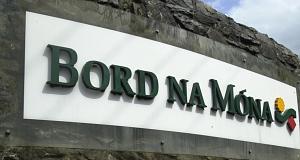Dumb and dumber at the Sunday Independent

Wage incresases at Bord na Móna will not be paid out of the public purse, regardless of what the Sunday Independent might have you believe. That's because it's a public limited company, or, to put it another way, a private enterprise. By Michael Taft.
The front page story on the Sunday Independent really says it all. Apparently, the Labour Court has awarded a pay increase to Bord na Móna workers. The Sindo no like. How dare workers get a pay increase? And in this dislike they make some claims which show how dumb some journalism can get when it is caught in an ideological frenzy:
"The recommendation by the Labour Court, on a broader level, would seem to make a mockery of a claim by the Government that it is getting to grips with the cost of the public sector.’
‘In recent weeks, several government ministers have said the public pay bill needs to be cut so that the country can escape a straitjacket imposed by the EU-IMF.’
‘In other words, the Labour Court does not believe that the economic crisis, which has forced the country to the brink of bankruptcy, is reason enough to impose cuts in public sector pay - let alone block a pay increase."
This is all very interesting – especially as Bord na Móna pay has absolutely nothing to do with public sector pay. Let me repeat that: Bord na Móna pay has absolutely nothing to do with public sector pay. You could slash workers’ wages by half, pay them in black bread and potato broth, and it would have no impact on the public sector pay bill.
Bord na Móna is a commercial public enterprise. It earns revenue in the marketplace by producing goods and services that people pay for. Out of that it earns profits and pays its workers. It sounds strangely like a private enterprise company; that’s because it is.
While its core business is the supply of peat as a fuel for electricity generation, it is also developing biomass and renewable energy. It is a solution provider in wastewater treatment and air pollution abatement systems. It manufactures and supplies media products for the horticultural market. It is involved in the collection and environmental treatment of waste. And sells into the domestic and export markets.
It does a good job. It earns nearly €400 million a year with an operating profit of €23 million, handing over €30 million in dividends to the state in the last four years. It has a strong profit margin of 18% (earnings before interest, depreciation, taxes and amortisation).
It employs over 2,000 workers directly – increasing their payroll by 100 in the last two years of the recession. But, of course, considerably more are employed, sourcing into Bord na Móna; all of these are in the private sector.
These are not the highest-paid public or private enterprise workers – far from it; less than an average €45,000 per employee. And since 2005, employees’ compensation has fallen from nearly 40% of total revenue to less than 30%. Indeed, Bord na Móna workers appear quite productive. Since 2002, company revenue earned per employee increased by over 55%.
So why is the Sindo attacking a profitable company which, albeit under a Labour Court recommendation, is paying a wage increase to productive workers in a commercial enterprise that sells into the domestic and export market?
Is it because they’re a tad confused – thinking that any company with the word ‘public’ in it pays their workers out of the Exchequer? If so, here is a hint to Sindo editors: a ‘public limited company’ is not part of the public sector.
This is all pretty dumb. But here’s where it gets dumber. What would happen if the Sindo got its way and the Bord na Móna workers don’t get a pay increase? Who would be the losers? Broadly speaking, there would be three losers.
First, of course, are the workers themselves and their families.
Second are local businesses that are dependent on the spending power of Bord na Móna workers. Given that the workers are average paid, they are likely to spend a disproportionate amount. Of course, they could use some of those extra earnings to get out of arrears or even save a bit. But it’s not likely they have accounts with Japanese hedge funds. This is a spending group.
The third loser is the Exchequer. Anywhere from 31 to 52% of the extra income goes directly to the Exchequer before it gets into the workers’ pockets. That doesn’t count the extra revenue from increased spending (VAT) nor increased employers’ PRSI.
From the reported 3.5% pay increase being awarded, using the State Assets report average pay finding, the Exchequer would benefit between €646 and €983 per employee. For the entire workforce, the Exchequer could benefit by up €1.5 million and more. That’s what comes from a successful and profitable company paying its employees more.
So what have we got? A major national newspaper that doesn’t know the difference between a commercial enterprise and the public sector. And from that basic ignorance, they demand a policy that will depress living standards, depress private sector activity and depress Exchequer revenue – a policy that will ensure we remain mired in recession.
You really couldn’t make this stuff up.
notesonthefront.typepad.com
